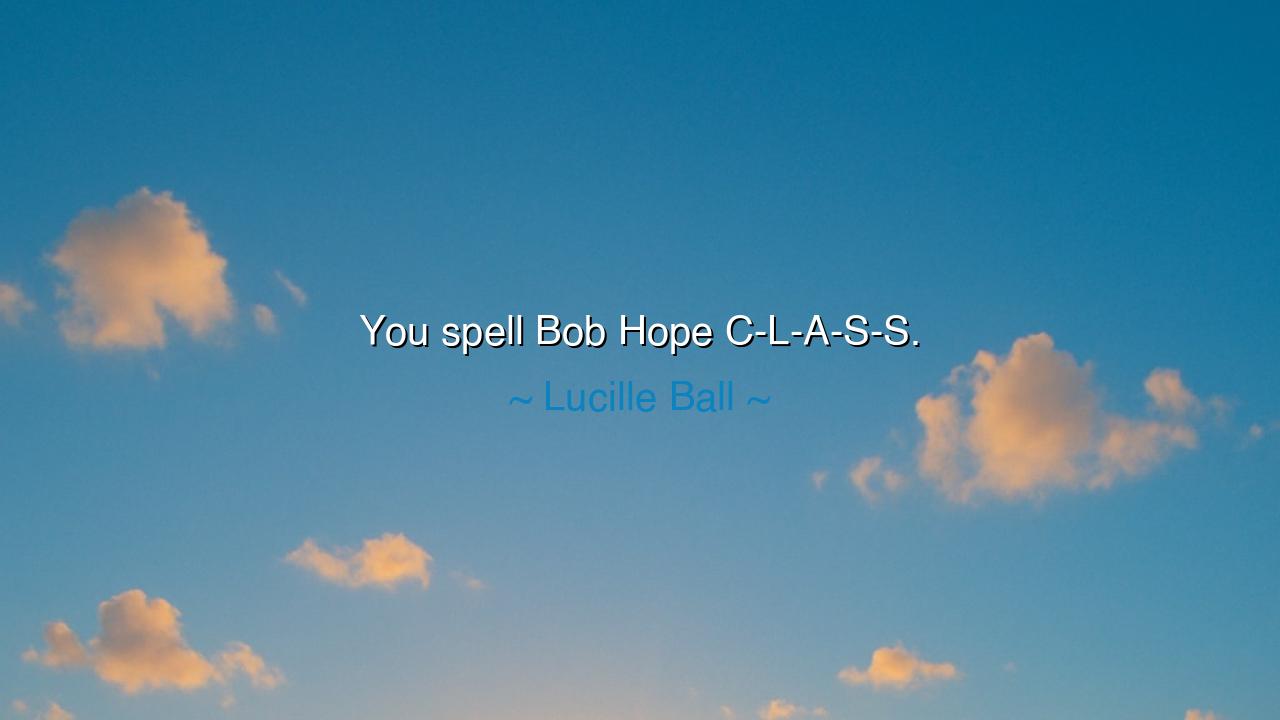
You spell Bob Hope C-L-A-S-S.






In the councils of memory, where elders speak of craft and character, hear Lucille Ball’s bright and flinty praise: “You spell Bob Hope C-L-A-S-S.” In one playful stroke she turns a name into a measure, a comedian into a compass. She is saying that Bob Hope was not merely famous, but formed—tempered by good manners, generosity, and steadiness under the hot lights. To call a person class is to say: their timing is sure, their humor is kind, their titles are many but their word is more. This is the old standard, the ancestral plumb line by which we judge whether a life stands straight.
The meaning reaches beyond Hollywood’s dazzle. Class is not a wardrobe but a way—how one enters a room, how one treats the least visible worker, how one uses a microphone when others have no voice. Ball knew this well; she had stood on more soundstages than most kings have rooms in their palaces. Her jest is a verdict: if you wish to spell excellence, do not start with style—start with stature; do not begin with applause—begin with regard. Ball’s praise names the invisible disciplines that make public brilliance safe to behold.
As for the origin, the line is widely attributed to Lucille Ball in anthologies of quotations and has circulated for decades in newspapers and tributes—a concise valediction from one comedy monarch to another. While a single on-camera moment for the quip is elusive, the attribution is consistent across reputable quotation compendia and memorial reprints, which preserve it as Ball’s affectionate definition of Hope’s persona.
The praise coheres with the public record of Bob Hope’s long service—decades of USO tours and tireless shows for men and women far from home. He carried jokes where the mail could not always go, and laughter where sleep was thin. This is the practical grammar of class: to spend one’s best material on weary audiences who can pay only in gratitude. History remembers this steady offering, not as sentiment, but as fact.
Consider a scene near the end of Ball’s life, when two old friends walked out together at the 61st Academy Awards in 1989. The house rose as one; the ovation rolled like surf. She, the red-haired architect of television’s most beloved mischief; he, the tireless emcee of America’s big nights and long wars. That appearance—her final public one—was a tableau of mutual honor: the queen and the ambassador, joined by a lifetime of sketches and shared storms. It was the audience, not the script, that finished Ball’s sentence about class.
A humbler story bears the same seal. An assistant grip, nameless to the credits, once told of a Hope taping where a cable snagged and the schedule soured. Hope paused the room with a shrug and a smile, walked to the tangle, and held the coil while the crew reset. No sighs, no scolding—just the unhurried dignity that turns a mishap into a rehearsal. “We’ll give the laugh after we give the room,” he said. It was five minutes no one will quote on a marquee, yet it fed a hundred loyalties. This is how class is spelled when cameras blink: patience, presence, proportion.
Let the teaching be plain. Class is the charioteer of talent; it keeps speed from becoming wreckage. It is the art of aiming wit without wounding, of standing centerstage without shrinking the company, of remembering the crew when the crowd remembers only the star. The ancients would say: honor is a habit. Practice three small rites—greet by name those who serve your day; leave places better than you found them; and, when the joke can go cruel or kind, choose kind and sharpen the craft instead.
Carry Ball’s benediction as a rule for your own work: if you wish your name to be spelled in gold, first spell C-L-A-S-S in deeds. Show up early; share credit widely; give your best set to the smallest room. Then let your laughter travel as Hope’s did—to the weary, the waiting, the ones without tickets. For in the end, reputations fade like posters in a window, but class is the ink that does not run. And when the elders gather to tell how you worked and how you walked, may someone rise and say of you what Lucy once said of Bob: you spell this life C-L-A-S-S.






AAdministratorAdministrator
Welcome, honored guests. Please leave a comment, we will respond soon